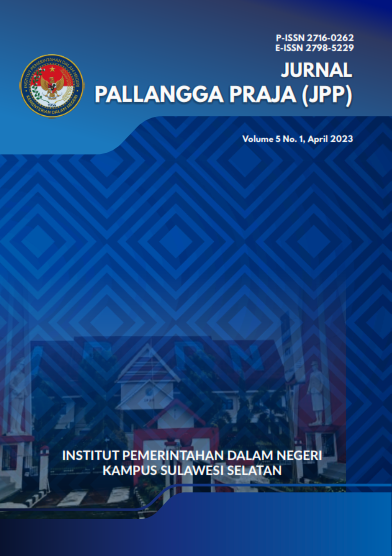MEMBANGUN PELAYANAN PUBLIK YANG INOVATIF DAN EFISIEN DI ERA DIGITAL DI INDONESIA
DOI:
https://doi.org/10.61076/jpp.v5i1.3428Keywords:
Pelayanan Publik, Inovasi, Efisiensi, Era DigitalAbstract
Pelayanan publik yang inovatif dan efisien merupakan salah satu indikator penting dalam pengukuran kemajuan suatu negara. Di era digital, teknologi memainkan peran penting dalam membentuk cara orang berinteraksi dengan layanan publik, serta menciptakan peluang baru untuk meningkatkan efisiensi dan efektivitas pelayanan publik. Artikel ini membahas bagaimana Indonesia dapat membangun pelayanan publik yang inovatif dan efisien di era digital, termasuk tantangan dan peluang yang dihadapi. Berdasarkan tinjauan literatur dan analisis data, artikel ini menyimpulkan bahwa pemerintah perlu meningkatkan investasi pada infrastruktur teknologi dan SDM, serta membangun budaya inovasi dalam pelayanan publik. Selain itu, penting untuk menerapkan prinsip desain berorientasi pengguna dan memperluas penerapan teknologi dalam layanan publik ke sektor-sektor lain. Pemerintah juga harus meningkatkan partisipasi masyarakat dalam pengembangan dan implementasi teknologi dalam pelayanan publik. Selain itu, transparansi, akuntabilitas, dan ketidakdiskriminan layanan publik juga merupakan prinsip penting dalam membangun pelayanan publik yang baik di era digital. Dalam menghadapi tantangan dan membangun pelayanan publik yang lebih baik, pemerintah perlu berkomitmen untuk terus meningkatkan kualitas dan efisiensi layanan publik serta memperkuat partisipasi dan kepercayaan masyarakat pada pemerintah. Dengan upaya-upaya ini, diharapkan Indonesia dapat memberikan pelayanan publik yang lebih baik, efisien, dan inovatif untuk meningkatkan kepercayaan masyarakat pada pemerintah dan memperbaiki kualitas hidup masyarakat Indonesia.
Downloads
References
Apolinário-Hagen, J., Hennemann, S., Kück, C., Wodner, A., Geibel, D., Riebschläger, M., Zeißler, M., & Breil, B. (2020). Exploring User-Related Drivers of the Early Acceptance of Certified Digital Stress Prevention Programs in Germany. Health Services Insights, 13, 1178632920911061. https://doi.org/10.1177/1178632920911061
Araujo, L. M. de, Priadana, S., Paramarta, V., & Sunarsi, D. (2021). Digital leadership in business organizations. International Journal of Educational Administration, Management, and Leadership, 2(1), 5–16. https://doi.org/10.51629/ijeamal.v2i1.18
Arundel, A., Bloch, C., & Ferguson, B. (2019). Advancing innovation in the public sector: Aligning innovation measurement with policy goals. Research Policy, 48(3), 789–798. https://doi.org/10.1016/j.respol.2018.12.001
Boellstorff, T. (2019). The opportunity to contribute: disability and the digital entrepreneur. Information Communication and Society, 22(4), 474–490. https://doi.org/10.1080/1369118X.2018.1472796
Denhardt, J. V., & Denhardt, R. B. (2015). The New Public Service Revisited. In Public Administration Review. https://doi.org/10.1111/puar.12347
Dong, L. (2015). Public Administration Theories: Instrumental and Value Rationalities. Pagrave Macmillan. https://doi.org/10.1007/978-3-319-31816-5_2372-1
Farazmand, A. (2018). Global encyclopedia of public administration, public policy, and governance. Springer.
Farida, U., Akib, H., & Jasruddin. (2015). Policy implementation of the national program for community empowerment in rural areas healthy and intelligent generation in Mamuju regency of West Sulawesi, Indonesia. International Journal of Economic Research, 12(5).
Hassan, A. Y. I., Lamura, G., & Hagedoorn, M. (2022). Predictors of digital support services use by informal caregivers: a cross-sectional comparative survey. BMJ Open, 12(4), e059897. https://doi.org/10.1136/bmjopen-2021-059897
Kollmann, T., Stöckmann, C., Niemand, T., Hensellek, S., & de Cruppe, K. (2019). A configurational approach to entrepreneurial orientation and cooperation explaining product/service innovation in digital vs. non-digital startups. Journal of Business Research, September, 0–1. https://doi.org/10.1016/j.jbusres.2019.09.041
Li, J., Dai, Y., Wang, C. C., & Sun, J. (2022). Assessment of Environmental Demands of Age-Friendly Communities from Perspectives of Different Residential Groups: A Case of Wuhan, China. International Journal of Environmental Research and Public Health, 19(15), 9120. https://doi.org/10.3390/ijerph19159120
Mansir, F., & Karim, A. (2020). Islamic education learning approaches in shaping students’ emotional intelligence in the digital age. Hayula: Indonesian Journal of Multidisciplinary Islamic Studies, 4(1), 67–86.
Mariyono, J. (2014). Rice production in Indonesia: policy and performance. Asia Pacific Journal of Public Administration, 36(2), 123–134.
Peters, B. G., & Pierre, J. (2006). Handbook of public policy. Handbook of Public Policy, 1–512. https://doi.org/10.4135/9781848608054
Rahmatullah, Inanna, Sahade, Nurdiana, Azis, F., & Bahri. (2020). Utilization of digital technology for management effectiveness micro small and medium enterprises. International Journal of Scientific and Technology Research, 9(4), 1357–1362.
Şahin, M., Duman, D., Gürses, S., Kaleş, D., & Woolls, D. (2018). Toward an empirical methodology for identifying plagiarism in retranslation. In Perspectives on retranslation (pp. 166–191). Routledge.
Santoso, R. S., Rostyaningsih, D., & Lestari, H. (2021). Public Policy Analysis: Problem Exploration and Recommendation to Public Service Innovation in Surakarta City Government. ICISPE 2020, October 09-10.
Sharma, M., Sahdev, S. L., Singh, G., & Kumar, B. (2020). Methodology for the Development of an Ontology based E-Learning Platform. 2020 International Conference on Computation, Automation and Knowledge Management (ICCAKM), 101–106.
Umbach, G., & Tkalec, I. (2022). Evaluating -governance through e-government: Practices and challenges of assessing the digitalisation of public governmental services. Evaluation and Program Planning, 93, 102118. https://doi.org/10.1016/j.evalprogplan.2022.102118
Yang, L., Martínez-Abad, F., & García-Holgado, A. (2022). Exploring factors influencing pre-service and in-service teachers´ perception of digital competencies in the Chinese region of Anhui. Education and Information Technologies, 1–26. https://doi.org/10.1007/s10639-022-11085-6



